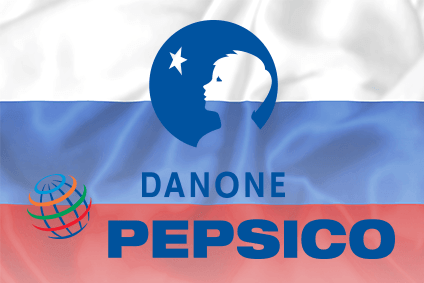For US and European companies exporting products to Russia, the operating environment has been challenging to say the least. Recent comments from Moscow would suggest that the going could get tougher for multinationals who operate local subsidiaries in the country as well, Katy Askew suggests.
This time last year, just-food ran a management briefing examining the prospects for FMCG companies in Russia’s cooling economy. On the whole, consumer goods analysts were positive on the opportunities presented by the country’s CPG sector.
The worm has certainly turned. The rapid escalation of political tensions between Moscow and western governments over the Ukrainian crisis has had a monumental impact on food companies that export products to Russia. In response to western sanctions, the Russian authorities implemented bans on meat, fish, dairy and produce from the US, EU, Australia, Canada and Norway in August.
The likes of dairy firms Valio, FrieslandCampina and Arla have seen export sales hit. European meat companies such as Atria, Danish Crown and HKScan have all suffered. Brussels has been forced to introduce emergency funds to support producers in areas such as fresh produce.
To date, international firms who operate local production facilities have been largely insulated from the impact of Russia’s import bans. That was, until late last week.
On a visit to Omsk on Friday (28 December) Russian Agriculture Minister Nikolai Fedorov struck out at both Danone and PepsiCo, claiming that their products contain only a fraction of fresh milk.

US Tariffs are shifting - will you react or anticipate?
Don’t let policy changes catch you off guard. Stay proactive with real-time data and expert analysis.
By GlobalData“In these products a maximum of 20% comes from real milk, the rest is a processed milk mixture with coconut, palm oil and other additives,” Fedorov said according to state-owned newswire Itar-Tass.
The minister urged regional governors to monitor the activities of PepsiCo-owned Wimm-Bill-Dann and Danone’s Unimilk. He suggested that the internationally-owned dairy producers are exploiting Russian dairy farmers and should not be allowed to “skim the cream off the cheap raw product that our poor peasants produce”.
Danone swiftly moved to counter the accusations, insisting that its standards are among the highest in the dairy sector. The company’s Russian unit said it was “deeply offended” by the minister’s comments which it views as “direct slander” designed to tarnish its reputation in Russia.
“We [have been] working in the Russian market for more than 20 years, have come here to stay, and intend to continue to work for the benefit of our consumers, customers and suppliers,” the firm said in a statement yesterday.
PepsiCo also refuted the claims. A spokesperson told just-food today: “We produce a broad range of high quality dairy products in Russia, using milk from farmers across the country. Our products and practices fully comply with Russian legislation and we use only cow’s milk.”
This latest incident points to further turbulent times for those operating in Russia. It is clear that even multinationals who produce products through local operating units – and pay local taxes – are not safe from the scrutiny of Russia’s political machine.
This could have some significant implications for Danone and PepsiCo. Danone generates around 10% of sales in Russia, while approximately 7% of PepsiCo’s sales originated from the country, the group’s second-largest market, this year.
In order to build these scalable footprints in the market, both companies have invested heavily in growth. In its statement yesterday, Danone stressed that its company operates 20 Russian factories and employs more than 12,000 people. The group’s investment in the country stands at about US$2bn, the statement continued.
“Every year, we pay billions of rubles in taxes in the budget of the Russian Federation, devote significant resources and efforts on the development of agriculture of the Russian Federation, agricultural training, extension and improvement of existing farms, construction of new farms,” Danone stressed.
Likewise, PepsiCo has been a big investor in Russia. The group – whose operations span dairy, to drinks, to snacks – has invested US$9bn into the Russia economy in the last decade, company documents reveal. PepsiCo operates more than 30 production plants and employs around 25,000 people in Russia.
A crackdown on operations in Russia therefore represents a significant risk for each company.
Even if PepsiCo and Danone avoid getting caught in the backlash against western companies, a slowdown of the Russian economy also presents a threat to sales and earnings at the American and French food giants.
And a slowdown looks increasingly likely as the Russian economy continues to retreat under a series of economic moves that are hitting confidence and reducing international investment levels. Import bans are threatening food shortages, economic growth is faltering and consumers are reigning in spending. Further trouble would seem to be brewing for those who operate in a market that was – until very recently – highly promising.





